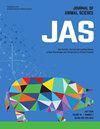The impact of exogenous vasoactive intestinal polypeptide (VIP) on inflammatory responses and mRNA expression of tight junction genes in lambs fed a high-grain diet
IF 2.7
2区 农林科学
Q1 AGRICULTURE, DAIRY & ANIMAL SCIENCE
引用次数: 0
Abstract
This study assessed the impact of administering vasoactive intestinal polypeptide (VIP) on inflammation and intestinal VIP and tight junction mRNA expression in lambs fed grain-based finishing diets. Sixteen wether lambs (69.6 ± 1.9 kg) were individually housed, adapted to a corn-based diet containing no forage, and randomly assigned to 2 treatment groups. Lambs were intraperitoneally injected every other day for 28 d with either saline (0.9% NaCl) with no VIP (n = 8; control) or saline with VIP (n = 8; 1.3 nmol/kg BW). Blood samples were collected weekly for analysis of cytokine concentrations, and on day 0 and 28 for lipopolysaccharide (LPS), and LPS binding protein (LBP) concentrations. Upon completion of the treatment period, lambs were euthanized and gastrointestinal tissues, including rumen, jejunum, cecum, and colon samples, collected for analysis of the expression of tight junction mRNA (claudin-1, claudin-4, occludin, and ZO-1), endogenous VIP, and VIP receptor (VPAC-1). No treatment effects (P ≥ 0.38) were observed for VIP and VPAC-1 mRNA expression in colon. Supplementation with VIP did not influence (P ≥ 0.28) the expression of claudin-1, claudin-4, occludin, and ZO-1 tight junction mRNA in the rumen, jejunum, cecum, and colon. Lambs treated with VIP had greater (P ≤ 0.01) plasma concentrations of the anti-inflammatory cytokines, IL-10 and IL-36RA. There were treatment by day interactions observed (P ≤ 0.02) for concentrations of the proinflammatory cytokines, MIP-1α and MIP-1β. Lambs that did not receive VIP had greater serum concentrations of LPS (P = 0.05) than the lambs receiving VIP. These data suggest that VIP administration may not influence tight junction mRNA expression but may decrease LPS concentrations and thus inflammation in lambs fed a grain-based diet.外源性血管活性肠道多肽(VIP)对高谷物饲粮羔羊炎症反应和紧密连接基因 mRNA 表达的影响
本研究评估了饲喂谷物精饲料的羔羊体内血管活性肠道多肽(VIP)对炎症、肠道VIP和紧密连接mRNA表达的影响。16 只绵羊(69.6 ± 1.9 千克)单独饲养,适应不含饲料的玉米日粮,并随机分配到 2 个处理组。羔羊在 28 天内每隔一天腹腔注射不含 VIP 的生理盐水(0.9% NaCl)(n = 8;对照组)或含 VIP 的生理盐水(n = 8;1.3 nmol/kg BW)。每周采集血样分析细胞因子浓度,第 0 天和第 28 天采集血样分析脂多糖(LPS)和 LPS 结合蛋白(LBP)浓度。治疗期结束后,对羔羊实施安乐死,并收集胃肠道组织,包括瘤胃、空肠、盲肠和结肠样本,以分析紧密连接 mRNA(claudin-1、claudin-4、occludin 和 ZO-1)、内源性 VIP 和 VIP 受体(VPAC-1)的表达。结肠中的 VIP 和 VPAC-1 mRNA 表达未受治疗影响(P ≥ 0.38)。补充 VIP 不会影响(P ≥ 0.28)瘤胃、空肠、盲肠和结肠中 claudin-1、claudin-4、occludin 和 ZO-1 紧密连接 mRNA 的表达。接受VIP治疗的羔羊血浆中抗炎细胞因子IL-10和IL-36RA的浓度更高(P≤ 0.01)。在促炎细胞因子 MIP-1α 和 MIP-1β 的浓度方面,观察到了不同治疗日之间的相互作用(P ≤ 0.02)。未服用 VIP 的羔羊血清中的 LPS 浓度(P = 0.05)高于服用 VIP 的羔羊。这些数据表明,服用 VIP 可能不会影响紧密连接 mRNA 的表达,但可以降低 LPS 的浓度,从而减少以谷物为主食的羔羊的炎症。
本文章由计算机程序翻译,如有差异,请以英文原文为准。
求助全文
约1分钟内获得全文
求助全文
来源期刊

Journal of animal science
农林科学-奶制品与动物科学
CiteScore
4.80
自引率
12.10%
发文量
1589
审稿时长
3 months
期刊介绍:
The Journal of Animal Science (JAS) is the premier journal for animal science and serves as the leading source of new knowledge and perspective in this area. JAS publishes more than 500 fully reviewed research articles, invited reviews, technical notes, and letters to the editor each year.
Articles published in JAS encompass a broad range of research topics in animal production and fundamental aspects of genetics, nutrition, physiology, and preparation and utilization of animal products. Articles typically report research with beef cattle, companion animals, goats, horses, pigs, and sheep; however, studies involving other farm animals, aquatic and wildlife species, and laboratory animal species that address fundamental questions related to livestock and companion animal biology will be considered for publication.
 求助内容:
求助内容: 应助结果提醒方式:
应助结果提醒方式:


